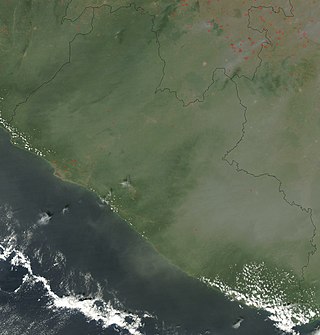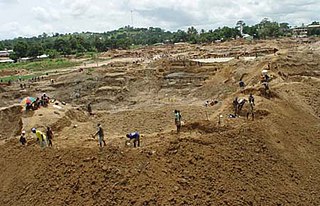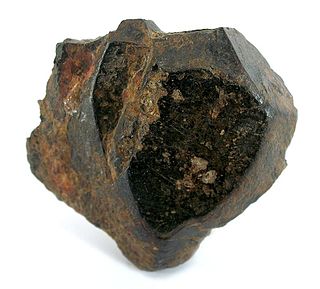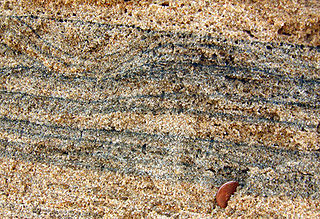
Liberia is a sub-Saharan nation in West Africa located at 6 °N, 9 °W. It borders the north Atlantic Ocean to the southwest and three other African nations on the other three sides, Sierra Leone to the northwest, Guinea to the northeast and Ivory Coast to the east.

The economy of Sierra Leone is $4.082 billion by gross domestic product as of 2018. Since the end of the Sierra Leone Civil War in 2002, the economy is gradually recovering with a gross domestic product growth rate between 4 and 7%. In 2008 it in PPP ranked between 147th by World Bank, and 153rd by CIA, largest in the world.

Ilmenite is a titanium-iron oxide mineral with the idealized formula FeTiO
3. It is a weakly magnetic black or steel-gray solid. Ilmenite is the most important ore of titanium and the main source of titanium dioxide, which is used in paints, printing inks, fabrics, plastics, paper, sunscreen, food and cosmetics.

Heavy mineral sands are a class of ore deposit which is an important source of zirconium, titanium, thorium, tungsten, rare-earth elements, the industrial minerals diamond, sapphire, garnet, and occasionally precious metals or gemstones.
Articles related to Mozambique include:

Kenmare Resources plc is a publicly traded mining company headquartered in Dublin, Republic of Ireland. Its primary listing is on the London Stock Exchange and it has a secondary listing on Euronext Dublin. Kenmare is one of the world's largest mineral sands producers and the Company owns and operates the Moma Titanium Minerals Mine. Moma is one of the world's largest titanium minerals deposits, located 160 km from the city of Nampula in Mozambique.
Iron ore production in Africa is dominated by South Africa, Mauritania and Algeria. Many countries possess iron ore deposits that are as yet untapped/unmined. Countries and companies currently involved in production are listed here; measurements are in tonnes per annum(year).
Aluminium in Africa originates from bauxite, and within Africa is primarily found in Guinea, Mozambique and Ghana. Guinea is by far the biggest producer in Africa, and is a world leader in bauxite production.

Iluka Resources is an Australian-based resources company, specialising in mineral sands exploration, project development, operations and marketing. Iluka is the largest producer of zircon and titanium dioxide–derived rutile and synthetic rutile globally. Iluka mines heavy mineral sands and separates the concentrate into its individual mineral constituents rutile, ilmenite, and zircon. Some of the ilmenite is then processed into synthetic rutile.
The second-largest mineral industry in the world is the mineral industry of Africa, which implies large quantities of resources due to Africa being the second largest continent, with 30.37 million square kilometres of land.With a population of 1.4 billion living there, mineral exploration and production constitute significant parts of their economies for many African countries and remain keys to economic growth. Africa is richly endowed with mineral reserves and ranks first in quantity of world reserves for bauxite, cobalt, industrial diamond, phosphate rock, platinum-group metals (PGM), vermiculite, and zirconium.
The mineral industry of Mozambique plays a significant role in the world's production of aluminium, beryllium, and tantalum. In 2006, Mozambique's share of the world's tantalum mine output amounted to 6%; beryllium, 5%; and aluminium, 2%. Other domestically significant mineral processing operations included cement and natural gas.
Richards Bay Minerals (RBM) is a South African mining company. RBM's principal product is titanium dioxide in the form of an 85% pure titanium dioxide slag; the company also produces the higher-purity 95% titanium dioxide product rutile as well as pig iron and zircon.

The mining industry of Sierra Leone accounted for 4.5 percent of the country's GDP in 2007 and minerals made up 79 percent of total export revenue with diamonds accounting for 46 percent of export revenue in 2008. The main minerals mined in Sierra Leone are diamonds, rutile, bauxite, gold, iron and limonite.
Siman Povarenkin is an Armenian entrepreneur with investments in metals & mining, geophysics and medical and health technology in Asia, Europe and Latin America. Povarenkin graduated from the Omsk State University with a degree in Chemistry and Petroleum Chemicals. In addition, he has completed courses in finance and banking at the Academy of Economics in Moscow, Bank Tutors Institute in Frankfurt, and the Intellectual Fund in Paris.
Jean-Raymond Boulle, COR is a Monaco-based Mauritian businessman, the founder of four publicly traded companies with deposits of nickel, cobalt, copper, zinc, titanium and diamonds.

The mining industry of Madagascar is mostly on a small scale, centred mainly around remote locations with large mineral deposits. Mining potential is noted in industrial and metallic minerals, energy, precious and semi-precious stones, as well as ornamental stone. The mining sector was neglected by the government for decades prior to the mid-2000s. In 2013, the mining industry, a main source of foreign investment, was struggling due to "low metals prices and distrustful companies", attributed to a 2009 coup.

The mining industry of Liberia has witnessed a revival after the civil war which ended in 2003. Gold, diamonds, and iron ore form the core minerals of the mining sector with a new Mineral Development Policy and Mining Code being put in place to attract foreign investments. In 2013, the mineral sector accounted for 11% of GDP in the country and the World Bank projected a further increase in the sector by 2017.

The mining industry of Senegal is mainly centred on the production of phosphates and industrial limestone. Senegal is one of the leading producers of phosphates in the world, accounting for about 6% of exports in 2006, and deposits are of a particularly high quality. In the coastal region of the country, titanium-bearing minerals have been found and the reserve is estimated at 10 million tons. The mineral sector's exports accounts for 20% of total exports of the country and constitutes 20% of the GDP.

The mining industry of Yemen is at present dominated by fossil mineral of petroleum and liquefied natural gas (LNG), and to a limited extent by extraction of dimension stone, gypsum, and refined petroleum. Reserves of metals like cobalt, copper, gold, iron ore, nickel, niobium, platinum-group metals, silver, tantalum, and zinc are awaiting exploration. Industrial minerals with identified reserves include black sands with ilmenite, monazite, rutile, and zirconium, celestine, clays, dimension stone, dolomite, feldspar, fluorite, gypsum, limestone, magnesite, perlite, pure limestone, quartz, salt, sandstone, scoria, talc, and zeolites; some of these are under exploitation.
Sierra Rutile Limited is a mining company with headquarters based in Freetown, Sierra Leone. The company currently has operating mines for Rutile, ilmenite, zircon, and titanium dioxide minerals in South and Northwest Sierra Leone, specifically in the Moyamba and Bonthe Districts. Australian-based Iluka Resources Limited acquired the company in December 2016 and subsequently installed new and currently acting CEO Rob Hattingh.










